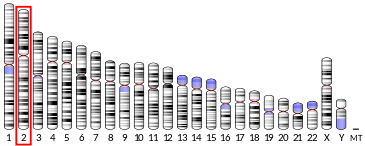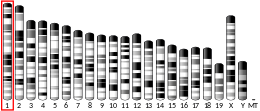INPP4A
Type I inositol-3,4-bisphosphate 4-phosphatase is an enzyme that in humans is encoded by the INPP4A gene.[5][6][7]
INPP4A encodes the inositol polyphosphate 4-phosphatase type I, one of the enzymes involved in phosphatidylinositol signaling pathways. This enzyme removes the phosphate group at position 4 of the inositol ring from inositol 3,4-bisphosphate.[7]
References
- 1 2 3 GRCh38: Ensembl release 89: ENSG00000040933 - Ensembl, May 2017
- 1 2 3 GRCm38: Ensembl release 89: ENSMUSG00000026113 - Ensembl, May 2017
- ↑ "Human PubMed Reference:".
- ↑ "Mouse PubMed Reference:".
- ↑ Norris FA, Auethavekiat V, Majerus PW (Aug 1995). "The isolation and characterization of cDNA encoding human and rat brain inositol polyphosphate 4-phosphatase". J Biol Chem. 270 (27): 16128–33. doi:10.1074/jbc.270.27.16128. PMID 7608176.
- ↑ Norris FA, Atkins RC, Majerus PW (Oct 1997). "The cDNA cloning and characterization of inositol polyphosphate 4-phosphatase type II. Evidence for conserved alternative splicing in the 4-phosphatase family". J Biol Chem. 272 (38): 23859–64. doi:10.1074/jbc.272.38.23859. PMID 9295334.
- 1 2 "Entrez Gene: INPP4A inositol polyphosphate-4-phosphatase, type I, 107kDa".
Further reading
- Zhang X, Majerus PW (1998). "Phosphatidylinositol signalling reactions". Semin. Cell Dev. Biol. 9 (2): 153–60. doi:10.1006/scdb.1997.0220. PMID 9599410.
- Norris FA, Atkins RC, Majerus PW (1997). "Inositol polyphosphate 4-phosphatase is inactivated by calpain-mediated proteolysis in stimulated human platelets". J. Biol. Chem. 272 (17): 10987–9. doi:10.1074/jbc.272.17.10987. PMID 9110986.
- Munday AD, Norris FA, Caldwell KK, et al. (1999). "The inositol polyphosphate 4-phosphatase forms a complex with phosphatidylinositol 3-kinase in human platelet cytosol". Proc. Natl. Acad. Sci. U.S.A. 96 (7): 3640–5. doi:10.1073/pnas.96.7.3640. PMC 22347. PMID 10097090.
- Joseph RE, Walker J, Norris FA (2000). "Assignment of the inositol polyphosphate 4-phosphatase type I gene (INPP4A) to human chromosome band 2q11.2 by in situ hybridization". Cytogenet. Cell Genet. 87 (3–4): 276–7. doi:10.1159/000015448. PMID 10702694.
- Shearn CT, Walker J, Norris FA (2001). "Identification of a novel spliceoform of inositol polyphosphate 4-phosphatase type Ialpha expressed in human platelets: structure of human inositol polyphosphate 4-phosphatase type I gene". Biochem. Biophys. Res. Commun. 286 (1): 119–25. doi:10.1006/bbrc.2001.5331. PMID 11485317.
- Strausberg RL, Feingold EA, Grouse LH, et al. (2003). "Generation and initial analysis of more than 15,000 full-length human and mouse cDNA sequences". Proc. Natl. Acad. Sci. U.S.A. 99 (26): 16899–903. doi:10.1073/pnas.242603899. PMC 139241. PMID 12477932.
- Ota T, Suzuki Y, Nishikawa T, et al. (2004). "Complete sequencing and characterization of 21,243 full-length human cDNAs". Nat. Genet. 36 (1): 40–5. doi:10.1038/ng1285. PMID 14702039.
- Colland F, Jacq X, Trouplin V, et al. (2004). "Functional proteomics mapping of a human signaling pathway". Genome Res. 14 (7): 1324–32. doi:10.1101/gr.2334104. PMC 442148. PMID 15231748.
- Gerhard DS, Wagner L, Feingold EA, et al. (2004). "The status, quality, and expansion of the NIH full-length cDNA project: the Mammalian Gene Collection (MGC)". Genome Res. 14 (10B): 2121–7. doi:10.1101/gr.2596504. PMC 528928. PMID 15489334.
- Ivetac I, Munday AD, Kisseleva MV, et al. (2005). "The type Ialpha inositol polyphosphate 4-phosphatase generates and terminates phosphoinositide 3-kinase signals on endosomes and the plasma membrane". Mol. Biol. Cell. 16 (5): 2218–33. doi:10.1091/mbc.E04-09-0799. PMC 1087230. PMID 15716355.
- Hillier LW, Graves TA, Fulton RS, et al. (2005). "Generation and annotation of the DNA sequences of human chromosomes 2 and 4". Nature. 434 (7034): 724–31. doi:10.1038/nature03466. PMID 15815621.
- Rual JF, Venkatesan K, Hao T, et al. (2005). "Towards a proteome-scale map of the human protein-protein interaction network". Nature. 437 (7062): 1173–8. doi:10.1038/nature04209. PMID 16189514.
This article is issued from
Wikipedia.
The text is licensed under Creative Commons - Attribution - Sharealike.
Additional terms may apply for the media files.






